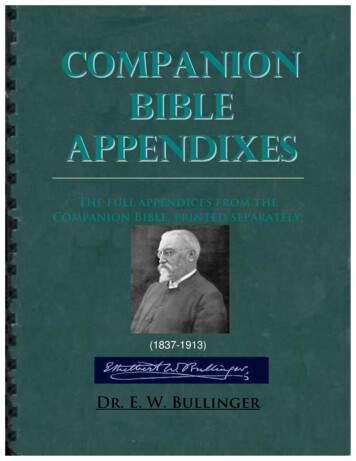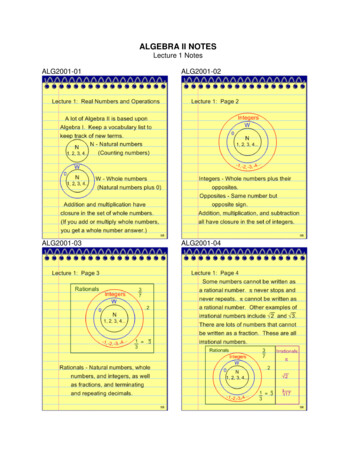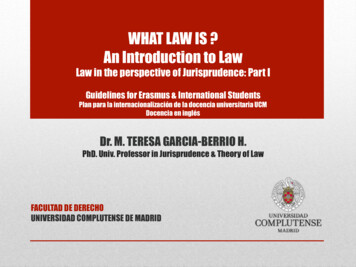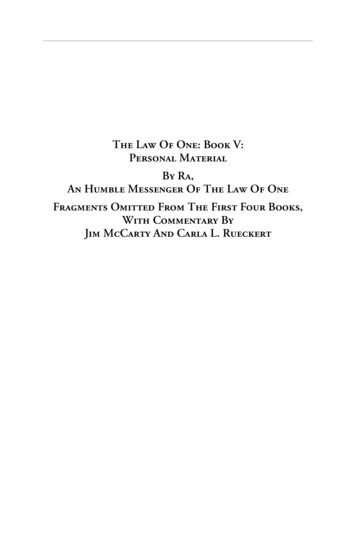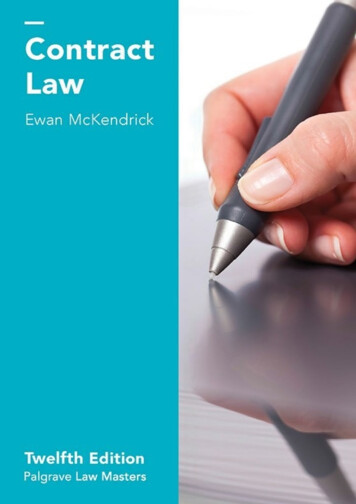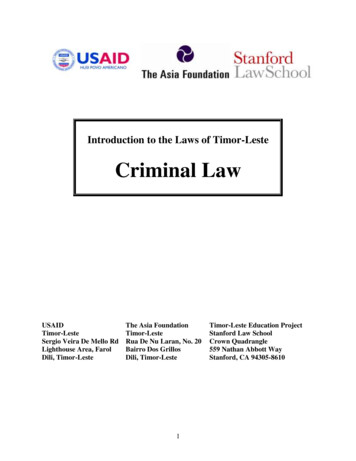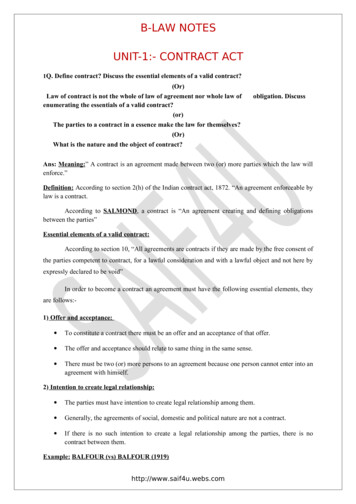
Transcription
B-LAW NOTESUNIT-1:- CONTRACT ACT1Q. Define contract? Discuss the essential elements of a valid contract?(Or)Law of contract is not the whole of law of agreement nor whole law ofenumerating the essentials of a valid contract?(or)The parties to a contract in a essence make the law for themselves?(Or)What is the nature and the object of contract?obligation. DiscussAns: Meaning:” A contract is an agreement made between two (or) more parties which the law willenforce.”Definition: According to section 2(h) of the Indian contract act, 1872. “An agreement enforceable bylaw is a contract.According to SALMOND, a contract is “An agreement creating and defining obligationsbetween the parties”Essential elements of a valid contract:According to section 10, “All agreements are contracts if they are made by the free consent ofthe parties competent to contract, for a lawful consideration and with a lawful object and not here byexpressly declared to be void”In order to become a contract an agreement must have the following essential elements, theyare follows:1) Offer and acceptance: To constitute a contract there must be an offer and an acceptance of that offer. The offer and acceptance should relate to same thing in the same sense. There must be two (or) more persons to an agreement because one person cannot enter into anagreement with himself.2) Intention to create legal relationship: The parties must have intention to create legal relationship among them. Generally, the agreements of social, domestic and political nature are not a contract. If there is no such intention to create a legal relationship among the parties, there is nocontract between them.Example: BALFOUR (vs) BALFOUR (1919)http://www.saif4u.webs.com
B-LAW NOTESFacts: A husband promised to pay his wife a household allowance of L 30 (pounds) every month.Later the parties separated and the husband failed to pay the amount. The wife sued for allowance.Judgment: Agreements such as there were outside the realm of contract altogether. Because there isno intention to create legal relationship among the parties.3) Free and Genuine consent: The consent of the parties to the agreement must be free and genuine. Free consent is said to be absent, if the agreement is induced by a)coercion, b)undueinfluence, c)fraud, d)Mis-representation, e)mistake.4) Lawful Object: The object of the agreement must be lawful. In other words, it means the object must not be(a) Illegal, (b) immoral, (c) opposed to public policy. If an agreement suffers from any legal flaw, it would not be enforceable by law.5) Lawful Consideration: An agreement to be enforceable by law must be supported by consideration. Consideration means “an advantage or benefit” moving from one party to other. In otherwords “something in return”. The agreement is enforceable only when both the parties give something and get something inreturn. The consideration must be real and lawful.6) Capacity of parties: (Competency) The parties to a contract should be capable of entering into a valid contract. Every person is competent to contract if(a). He is the age of majority.(b). He is of sound mind and(c). He is not dis-qualified from contracting by any law. The flaw in capacity to contract may arise from minority, lunacy, idiocy, drunkenness, etc.,7) Agreement not to be declared void: The agreements must not have been expressly declared to be void u/s 24 to 30 of the act.Example: Agreements in restraint of trade, marriages, legal proceedings, etc.,8) Certainty:http://www.saif4u.webs.com
B-LAW NOTES The meaning of the agreement must be certain and not be vague (or) indefinite. If it is vague (or) indefinite it is not possible to ascertain its meaning.Example:‘A’ agrees to sell to ‘B’ a hundred tones of oil. There is nothing whatever to show what kindof a oil intended. The agreement is void for uncertainty.9) Possibility of performance: The terms of an agreement should be capable of performance. The agreement to do an act impossible in itself is void and cannot be enforceable.Example:‘A’ agrees with ‘B’, to put life into B’s dead wife, the agreement is void it is impossible ofperformance.10) Necessary legal formalities: According to Indian contract Act, oral (or) written are perfectly valid. There is no provision for contracting being written, registered and stamped. But if is required by law, that it should comply with legal formalities and then it should becomplied with all legal (or) necessary formalities for its enforceability.2Q. Define offer (OR) proposal? Explain the legal rules as to a valid offer also discuss the lawrelating to communication of offer and revocation of offer?Ans: Definition:According to section 2(a) of Indian contract act, 1872, defines offer as “when one personsignifies to another his willingness to do (or) to abstain from doing anything with a view to obtainingthe assent of that otherto, such act (or) abstinence, he his said to make a proposal”.Legal rules (OR) Essential elements of a valid offer / proposal:1) Offer must be capable of creating legal relations: A social invitation, even if it is accepted doesnot create legal relationship because it is not so intended to create legal relationship. Therefore, anoffer must be such as would result in a valid contract when it is accepted.2) Offer must be certain, definite and not vague: If the terms of the offer are vague, indefinite, anduncertain, it does not amount to a lawful offer and its acceptance cannot create any contractualrelationship.http://www.saif4u.webs.com
B-LAW NOTES3) Offer must be communicated: An offer is effective only when it is communicated to the personwhom it is made unless an offer is communicated; there is no acceptance and no contract. Anacceptance of an offer, in ignorance of the offer can never treated as acceptance and does not createany right on the acceptor.Example: LALMAN SHUKLA (VS) GAURI DATT. (1913)Facts: ‘S’ sent his servant, ‘L’ to trace his missing nephew. He than announced that anybody wouldbe entitled to a certain reward. ‘L’ traced the boy in ignorance of his announcement. Subsequently,when he came to know of his reward, he claimed it.Judgment: He was not entitled fro the reward.4) Offer must be distinguished from an invitation to offer: A proposer/offer must be distinguishedfrom an invitation to offer. In the case of invitation to offer, the person sending out the invitation doesnot make any offer, but only invites the party to make an offer. Such invitations for offers are notoffers in the eyes of law and do not become agreement by the acceptance of such offers.Example: Pharmaceutical society of great Britain (vs) Boots cash chemists (1953).Facts: Goods are sold in a shop under the ‘self service’ system. Customers select goods in the shopand take them to the cashier for payment of price.Judgment: The contract, in this case, is made, not when a customer selects the goods, but when thecashier accepts the offer to buy and receives the price.5) Offer may be expressed (or) implied: An offer may be made either by words (or) by conduct. Anoffer which is expressed by words (i.e., spoken or written) is called an ‘express offer’ and offerwhich is inferred from the conduct of a person (or) the circumstances of the case is called an ‘impliedoffer’.6) Offer must be made between the two parties: There must be two (or) more parties to create avalid offer because one person cannot make a proposal/offer to him self.7) Offer may be specific (or) general: An offer is said to be specific when it is made to a definiteperson, such an offer is accepted only by the person to whom it is made. On the other hand generaloffer is one which is made to a public at large and maybe accepted by anyone who fulfills therequisite conditions.Example: Carilill (vs) Carbolic Ball company (1893).Facts: A company advertised in several newspapers is that a reward ofL 100(pounds) would begiven to any person contracted influenza after using the smoke ball according to the printedhttp://www.saif4u.webs.com
B-LAW NOTESdirections. Once Mr.Carilill used the smoke balls according to the directions of the company butcontracted influenza.Judgment: she could recover the amount as by using the smoke balls she accepted the offer.8) Offer must be made with a view to obtaining the assent: A offer to do (or) not to do somethingmust be made with a view to obtaining the assent of the other party addressed and it should not mademerly with a view to disclosing the intention of making an offer.9) Offer must not be statement of price: A mere statement of price is not treated as an offer to sell.Therefore, an offer must not be a statement of price.Example: HARVEY (VS) FACEY (1893):Facts: Three telegrams were exchanged between Harvey and Facey.(a) “Will you sell us your Bumper hall pen? Telegram lowest cash price- answer paid”. [Harveyto Facey].(b) “Lowest price fro bumper hall penL 900 (pounds)”. [ Facey to Harvey ](c) “We agree to buy Bumper hall pen for the sum ofL 900 (pounds) asked by you”. [ Facey toHarvey]Judgment: There was no concluded contract between Harvey and Facey. Because, a mere statementof price is not considered as an offer to sell.10) Offer should not contain a term “the non-compliance” of which may be assumed to amount toacceptance.COMMUNICATION OF OFFER AND REVOCATION OF OFFER: An offer, its acceptanceand their revocation (withdrawal) to be complete when it must be communicated to the offeree. Thefollowing are the rules regarding communication of offer and revocation of offer:(a) Communication of offer:i) The communication of an offer is complete when it comes to the knowledge of the personto whom it is made.ii) An offer may be communicated either by words spoken (or) written (or) it may be inferredfrom the conduct of the parties.iii) When an offer/proposal is made by post, its communication will be complete when theletter containing the proposal reaches the person to whom it is made.(b) Revocation of offer: A proposal/offer may be revoked at anytime before the communication of itsacceptance is complete as against the proposer, but not afterwards.http://www.saif4u.webs.com
B-LAW NOTES3Q. When does an offer comes to an end?ORWhen an offer does may be revoked (or) lapses?ORRevocation of offer otherwise than by communication?Ans: Definition:According to section 2(a) of Indian contract act, 1872, defines offer as “when one personsignifies to another his willingness to do (or) to abstain from doing anything with a view to obtainingthe assent of that otherto, such act (or) abstinence, he his said to make a proposal”.Revocation (or) lapses of offer: Section 16, of the Indian contract act, 1872 deals with variousmodes of revocation of offer. According to it, an offer is revoked/lapses (or) comes to an end underfollowing circumstances.1) By communication of notice: An offeror may revoke his offer at any time before the acceptanceby giving a simple notice of revocation, which can be either oral (or) written.Example: HARRIS (VS) NIKERSON (1873).Facts: An auctioneer in a newspaper that a sale of office furniture would be held. A broker came froma distant place to attend that auction, but all the furniture was withdrawn. The broker there upon suedauctioneer for his loss of time and expenses.Judgment: A declaration of intention to do a thing did not create a binding contract with those whoacted upon it. So, that the broker could not recover.2) By lapse of reasonable time: An offer will revoke if it is not accepted with in theprescribed/reasonable time. If however, no time is prescribed it lapses by the expiry of a reasonabletime.Example: Ramsgate victoria Hotel Company (vs) Monteflore (1886)Facts: On June 8th ‘M’ offered to take shares in ‘R’ Company. He received a letter of acceptance onNovember 23rd. he refused to take shares.Judgment: ‘M’ was entitled to refuse his offer has lapsed as the reasonable period which it could beaccepted and elapsed.3) By non-fulfillment of some conditions: When offeror has prescribed some conditions to befulfilled and offeree/ acceptor fails to fulfill the conditions required to acceptance. In such a case offerwill be revoked.http://www.saif4u.webs.com
B-LAW NOTES4) By death (or) insanity of the offeror: The death of the offeror does not automatically revoke theoffer. When the death (or) insanity of the offeror provided the offeree comes to know before itsacceptance it will be revoked. Otherwise if he accepts an offer in ignorance of the death (or) insanityof the offeror, the acceptance is valid.5) By a counter offer: “counter offer” means when the offeree/acceptor offers to qualified acceptanceof the offer subject to modifications and variations in the terms of original offer. Therefore counteroffer amounts to rejection of the original offer.Example: Hyde (vs) Wrench (1840)Facts: ‘W’ offered to sell a farm to ‘H’ for L 1000 (pounds). ‘H’ offered L 950 (pounds) ‘W’ refusedthe offer. Subsequently, ‘H’ offered to purchase the farm for L 1000 (pounds).Judgment: There was no contract as ‘H’ by offeringL950 (ponds) had rejected the original offer.Because the counter offer to a proposal amounts to its rejection.6) By change in law: An offer comes to an end if the law is changed so as to make the contractcontemplated by the offer illegal (or) incapable of performance.7) An offer is not accepted according to the prescribed (or) usual mode: If the offer is notaccepted according to the prescribed (or) usual mode, provides offeror gives notice to the offeree within a reasonable time that the offer is not accepted according to the prescribed/usual mode. If theofferor keeps quite, he is deemed to have accepted the offer.8) By death (or) insanity of the offeree/acceptor.9) By destruction of the subject matter.4Q. “An acceptance to be effective must be communicated to the offeror”. Are there anyexceptions to this rule?(OR)Define acceptance? Explain the rules regarding a valid acceptance?Ans: Definition:According to section 2(b) of the Indian contract Act, 1872, defines an acceptance is “when theperson to whom the proposal is made signifies is assent thereto, the proposal is said to be acceptedbecomes a promise”.On the acceptance of the proposal, the proposer is called the promisor/offeror and theacceptor is called the promise/offeree.Legal rules as to acceptance: A valid acceptance must satisfies the following rules:http://www.saif4u.webs.com
B-LAW NOTES1) Acceptance must be obsolute and unqualified: An acceptance to be valid it must be obsolute and unqualified and in accordance with theexact terms of the offer. An acceptance with a variation, slight, is no acceptance, and may amount to a mere counteroffer (i.e., original may or may not accept.2) Acceptance must be communicated to the offeror: For a valid acceptance, acceptance must not only be made by the offeree but it must also becommunicated by the offeree to the offeror. Communication of the acceptance must be expressed or implied. A mere mental acceptance is no acceptance.3) Acceptance must be according to the mode prescribed (or) usual and reasonable manner: If the offeror prescribed a mode of acceptance, acceptance must given according to the modeprescribed. If the offeror prescribed no mode of acceptance, acceptance must given according to someusual and reasonable mode. If an offer is not accepted according to the prescribed (or) usual mode. The proposer maywithin a reasonable time give notice to the offeree that the acceptance is not according to themode prescribed. If the offeror keeps quite he is deemed to have accepted the acceptance.4) Acceptance must be given with in a reasonable time: If any time limit is specified, the acceptance must be given with in that time. If no time limit is specified, the acceptance must be given with in a reasonable time.Example: Ramsgate victoria Hotel Company (vs) Monteflore (1886)Facts: On June 8th ‘M’ offered to take shares in ‘R’ Company. He received a letter of acceptance onNovember 23rd. he refused to take shares.Judgment: ‘M’ was entitled to refuse his offer has lapsed as the reasonable period which it could beaccepted and elapsed.5) It cannot precede an offer: If the acceptance precedes an offer, it is not a valid acceptance and does not result in acontract. In other words “acceptance subject to contract” is no acceptance.http://www.saif4u.webs.com
B-LAW NOTES6) Acceptance must be given by the parties (or) party to whom it is made: An offer can be accepted only by the person (or) persons to whom it is made. It cannot be accepted by another person without the consent of the offeror.Example: Boulton (vs) Jones (1857).Facts: Boulton bought a hose-pipe business from Brocklehurst. Jones, to whom Brocklehurst owed adebt, placed an order with Brocklehurst for the supply of certain goods. Boulton supplied the goodseven though the order was not addressed to him. Jones refused to pay Boulton for the goods becausehe, by entering into a contract with Brocklehurst, intended to set off his debt against Brocklehurst.Judgment: The offer was made to the Brocklehurst and it was not in the power of Boulton to step inand accept. Therefore there was no contract.7) It cannot be implied from silence: Silence does not amount to acceptance. If the offeree does not respond to offer (or) keeps quite, the offer will lapse after reasonabletime. The offeror cannot compel the offeree to respond offer (or) to suggest that silence will beequivalent to acceptance.8) Acceptance must be expressed (or) implied: An acceptance may be given either by words (or) by conduct. An acceptance which is expressed by words (i.e., spoken or written) is called ‘expressedacceptance’. An acceptance which is inferred by conduct of the person (or) by circumstances of the case iscalled an ‘implied or tacit acceptance’.Example: Carilill (vs) Carbolic Ball company (1893).Facts: A company advertised in several newspapers is that a reward of L 100 (ponds) would be givento any person contracted influenza after using the smoke ball according to the printed directions. OnceMr.Carilill used the smoke balls according to the directions of the company but contracted influenza.Judgment: she could recover the amount as by using the smoke balls she accepted the offer.9) Acceptance may be given by performing some condition (or) by accepting some consideration.http://www.saif4u.webs.com
B-LAW NOTES10) Acceptance must be made before the offer lapses (or) before the offer is withdrawn.5Q. Write a short notes on consensus-ad-idem.Ans: The essence of an agreement is the meeting of the minds of the parties in full and finalagreement; there must, be consensus-ad-idem. The expression “agreement” as defined in section 2 (e)is essentially and exclusively consensual in nature (i.e., before there can be an agreement between thetwo parties, there must be consensus-ad-idem).This means that the parties to the agreement must have agreed about the subject-matter of theagreement in the same sense and at the same time. Unless there is consensus-ad-idem, there can be nocontract.Example: ‘A’ who owns two horses named Rajhans and Hansraj. ‘A’ selling horse Rajhans to ‘B’.‘B’ thinks that he is purchasing horse Hansraj. There is no consensus-ad-idem, there can be nocontract.6Q. Cross offer.Ans: when two (or) more identical offers exchanged between the parties in ignorance at the time ofeach other’s offer, the offer are called as cross offers. In such a case, the courts construe one offer asthe offer and the other as the acceptance. Thus a cross offer will not create any contract.Example: ‘A’ offers to sell his car to ‘B’ for RS.15000/-. ‘B’ at the same time, offers by a letter tobuy ‘A’s car for Rs.15000/-. The two letters cross each other in the post. In such a case the courtsconstrue one offer as the offer and the other as the acceptance. Thus there was no concluded contractbetween ‘A’ and ‘B’.http://www.saif4u.webs.com
B-LAW NOTES7Q Distinguish between void contract and voidable contract.Ans: The following are the differences between void and voidable contract. They are follows:BaseDefinitionVoid contractVoidable contractAccording to section 2(j) a void According to section 2(i) a voidablecontract as ‘a contract which ceases to contractis‘anagreementwhichisbe enforceable by law becomes void enforceable by law at the option of one orwhen it ceases to be enforceable’.more the parties but not at the option of theother or other or others’.NatureA void contract is valid when it isA voidable contract on the other hand ismade. But binding on the parties it may voidable at the option of the aggrievedsubsequently become void. We may party and remains valid until rescinded bytalk of such a contract as void him. Contract caused by coercion, revoidable. But in case contract is caused bymistake it is void.RightsA void contract does not provide any The aggrieved party in a voidable contractlegal remedy for the parties to the gets a right to rescind the contract. Whencontract. It may void of into right fromsuch party rescinds it, the contract becomethe beginning. In other words it is not a void. In case aggrieved party does notcontract at allrescind the contract with in a reasonabletime, the contract remains valid.8Q.Counter offer.Ans: when the offeree offers to qualified acceptance of the offer subject to modifications andvariations in the terms of the original offer, he is said to have made a counter offer. Counter offeramounts to rejection of the original offer. In such a case an offer may be revoked.Example: Hyde (vs) Wrench (1840)http://www.saif4u.webs.com
B-LAW NOTESFacts: ‘W’ offered to sell a farm to ‘H’ forL1000 (pounds). ‘H’ offeredrefused the offer. Subsequently, ‘H’ offered to purchase the farm forL950 (pounds) ‘W’L 1000 (pounds).Judgment: There was no contract as ‘H’ by offering L 950 (pounds) had rejected the original offer.Because the counter offer to a proposal amounts to its rejection.9Q. Communication of offer:Ans:An offer, its acceptance and their revocation (withdrawal) to be complete when it must becommunicated. When the contracting parties are face to face and negotiate in person, a contract comesinto existence the movement the offeree gives his absolute and unqualified acceptance to the proposalmade by the offeror.The following are the rules regarding communication of offer:i) The communication of an offer is complete when it comes to the knowledge of the personto whom it is made.ii) An offer may be communicated either by words spoken (or) written (or) it may be inferredfrom the conduct of the parties.iii) When an offer/proposal is made by post, its communication will be complete when theletter containing the proposal reaches the person to whom it is made.10Q. Communication of acceptance.Ans: An offer, its acceptance and their revocation (withdrawal) to be complete when it must becommunicated. When the contracting parties are face to face and negotiate in person, a contract comesinto existence the movement the offeree gives his absolute and unqualified acceptance to the proposalmade by the offeror.The following are the rules regarding communication of acceptance:1) Communication of an acceptance is complete:a) As against the proposer/offeror when it is put into the certain course of transmission to him,so as to be out of the power of the acceptor.http://www.saif4u.webs.com
B-LAW NOTESb) As against the acceptor, when its comes to knowledge of the proposer.2) When a proposal is accepted by a letter sent by the post the communication of acceptance will becomplete:a) As against the proposer when the letter of acceptance is posted andb) As against the acceptor when the letter reach the proposer.11Q. Communication of revocation.Ans: An offer, its acceptance and their revocation (withdrawal) to be complete when it must becommunicated. When the contracting parties are face to face and negotiate in person, a contract comesinto existence the movement the offeree gives his absolute and unqualified acceptance to the proposalmade by the offeror.The following are the rules regarding communication of revocation:1) As against the person who makes it, when it put into a course of transmission.2) As against the person to whom it is made, when its comes to his knowledge.12Q. Invitation to make an offer. (Or)Offer and invitation to offer.Ans:If a person makes an invitation to make an offer/proposal, the other person makes anoffer/proposal in response. The offer/proposal may or may not be accepted.Example: - Tender notice is an invitation to make a proposal/offer. Then the response to a tendernotice is an offer and can be in two ways:1) A definite offer: When a tender is submitted, in response to an invitation for supply of goodsand services in specified quantities, in a specific and definite manner, it is a definite offer.2) A standing offer: sometimes a tender is submitted, in response to an invitation for supply ofgoods and services in a continuous way over a period of time, such an offer is said to bestanding (or) continuous offer.As soon an order is made a contract is created.13Q. Revocation of offer and acceptance.http://www.saif4u.webs.com
B-LAW NOTESAns: Revocation of offer: A proposal/offer may be revoked at anytime before the communication ofits acceptance is complete as against the proposer, but not afterwards.Revocation of acceptance: An acceptance may be revoked at any time before thecommunication of acceptance is complete as against the acceptor, but not afterwards.Example: ‘A’ makes proposal to ‘B’ to sell his house at a certain price. The letter is posted on 1st ofthe month. ‘B’ accepts the proposal by a letter sent by post on 4th. The letter reaches ‘A’ on the 6th.‘A’ may revoke his offer at any time before ‘B’ posts his letter of acceptance. (i.e., on 4 th, butnot afterwards).‘B’ may revoke his acceptance at any time before the letter of acceptance reaches ‘A’. (i.e.,on 6th, but not afterwards).14Q. Communication of offer, acceptance and revocation.(Or)When is communication complete?Ans: An offer, its acceptance and their revocation (withdrawal) to be complete when it must becommunicated. When the contracting parties are face to face and negotiate in person, a contract comesinto existence the movement the offeree gives his absolute and unqualified acceptance to the proposalmade by the offeror.Rules regarding the communication of offer, acceptance and revocation are laid down insection 4, as follows.Communication of offer: The following are the rules regarding communication of offer:1) The communication of an offer is complete when it comes to the knowledge of the personto whom it is made.2) An offer may be communicated either by words spoken (or) written (or) it may be inferredfrom the conduct of the parties.3) When an offer/proposal is made by post, its communication will be complete when theletter containing the proposal reaches the person to whom it is made.Example: ‘A’ makes proposal to ‘B’ to sell his house at a certain price. The letter is posted on 10 thJuly. It reaches ‘B’ on 12th July. The communication of offer is complete when ‘B’ receives the letter(i.e., on 12th July).http://www.saif4u.webs.com
B-LAW NOTESCommunication of acceptance: The following are the rules regarding communication ofacceptance:1) Communication of an acceptance is complete:a) As against the proposer/offeror when it is put into the certain course of transmission to him,so as to be out of the power of the acceptor.b) As against the acceptor, when its comes to knowledge of the proposer.2) When a proposal is accepted by a letter sent by the post the communication of acceptance will becomplete:a) As against the proposer when the letter of acceptance is posted andb) As against the acceptor when the letter reach the proposer.Communication of revocation: The following are the rules regarding communication of revocation:1) As against the person who makes it, when it put into a course of transmission.2) As against the person to whom it is made, when its comes to his knowledge.Example: ‘A’ proposes by a letter, to sell a house to ‘B’ at a certain price. The letter is posted on 15 thmay. It reaches ‘B’ on 19th may. ‘A’ revokes his offer by telegram on 18th may. The telegram reaches‘B’ on 20th may. The revocation is complete against ‘A’ when the telegram is dispatched (i.e., in 18thmay). It is complete as against the ‘B’ when he receives it (i.e., on 20th may).1-ICA (consideration)-315Q. Define consideration? What are the rules as to consideration?Ans: Meaning:Consideration is a technical term used in the sense of quid-pro-quo (i.e., some thing inreturn). When a party to an agreement promises to do something, he must get something in return.This “something” is defined as consideration.http://www.saif4u.webs.com
B-LAW NOTESDefinition:According to section 2(d) of the Indian contract Act, 1872, defines consideration as “when atthe desire of the promisor, the promise (or) any other person has done (or) abstained from doing, (or)does (or) abstains from doing, (or) promises to do (or) to abstain from doing, something, such act (or)abstinence (or) promise is called a consideration for the promise”.Example: Abdul Aziz (vs) Masum Ali (1914)Facts: The secretary of a mosque committee filed a suit to enforce a promise which the promisor hadmade to subscribe Rs.500/- for rebuilding a mosque.Judgment: ‘The promise was not enforceable because there was no consideration in the sense ofbenefit’, as ‘the person who promised gained nothing in return for the promise made’, and thesecretary of the committee to whom the promise was made, suffered no detriment (liability) asnothing had been done to carry out the repairs. Hence the suit was dismissed.Essentials of a valid consideration:- The following are the essentials of a valid consideration (OR)legal rules as to consideration.1. It may be past, present (or) future: The words “has done (or) abstained from doing refe
B-LAW NOTES directions. Once Mr.Carilill used the smoke balls according to the directions of the company but contracted influenza. Judgment: she could recover the amount as by using the smoke balls she accepted the offer. 8) Offer must be made with a view to obtaining the assent: A offer to do (or) not to do something must be made with a view to obtaining the assent of the other party .


